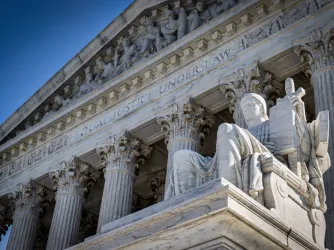Table of Contents
Trump can’t stop Politico from disclosing info allegedly stolen by hackers

ssi77 / Shutterstock.com
Imagine you’re a journalist and you receive an anonymous email claiming to have attached internal documents of a presidential campaign. You open the attachments to find confidential communications showing the campaign’s inner workings. You publish the documents because you figure doing so is in the public interest. But then campaign officials claim the documents were illegally obtained and argue publishing the documents was foul play.
That’s exactly the situation in which Politico currently finds itself after publishing Trump campaign internal documents, which Trump alleges were stolen and provided by an Iranian hacking operation.
The question now is: Can Trump force Politico to take the documents down?
Simply put: No.
This is far from the first time something like this has happened. Stolen information is relayed to the public via journalists so frequently that the stories are regularly taken up by Hollywood. The paradigmatic example is Daniel Ellsberg illegally secreting copies of the Pentagon Papers in his apartment and then disclosing them to The New York Times. Publishing the documents revealed that top U.S. officials misled the public about various aspects of the Vietnam War. More recently, classified documents leaked by former National Security Agency contractor Edward Snowden to The Guardian exposed a worldwide surveillance program. U.S. and world history may have looked quite different had newspapers refused to print stories based on government information leaked by Ellsberg and Snowden, among others.
So, when it comes to Politico publishing articles based on potentially hacked Trump campaign documents, neither Trump nor any other political candidate can use the force of law to stop the publication of truthful information.
Many have raised concerns that nefarious actors could hack public or private entities and send stolen information to media outlets in order to undermine democracy or national security. In 2016, for example, the Obama administration, among others, alleged Russian agents infiltrated Democratic National Committee email accounts and provided private emails to Wikileaks for publication in order to “sow doubt and confusion into our electoral process.”
But while politicians, pundits, and social-media posters alike can debate the ethics of publishing stolen information, the U.S. Supreme Court has provided a definitive answer on how the First Amendment views these situations: The government cannot prevent the publication of stolen information so long as it is truthful, it relates to an issue of public significance, and those who disclosed it played no part in the theft.
The First Amendment protects the right to publish information illegally obtained by third parties
In the early 1970s, the Nixon administration sued to stop The New York Times from publishing an internal government report detailing information about the Vietnam War that had been hidden from the public. Nixon argued that publishing the report, which became known as the Pentagon Papers, put national security at risk.
That argument did not sway a majority of the Supreme Court. In a plurality decision with five concurring opinions, the Court decided the freedom of the press could not give way to government attempts at prior restraint, even over national security concerns. As Justice Black wrote in his concurring opinion, “Both the history and language of the First Amendment support the view that the press must be left free to publish news, whatever the source, without censorship, injunctions, or prior restraints.” That Daniel Ellsberg had illegally taken the Pentagon Papers before they reached the Times was of no consequence.

Fast-forward 30 years to Bartnicki v. Vopper. There, the Supreme Court squarely held the First Amendment protects publishing illegally obtained information when it is truthful, related to an issue of public concern, and the discloser played no part in stealing the information.
In Bartnicki, a radio host played audio on his show from an intercepted phone call between two union officials who had been involved in a well-reported teachers’ union contract dispute. Other news outlets soon followed suit. The union officials sued based on state and federal laws prohibiting disclosure of intercepted calls when the disclosing party had reason to know the communication was illegally intercepted.
As Justice John Paul Stevens wrote in his majority opinion, the case presented “a conflict between interests of the highest order — on the one hand, the interest in the full and free dissemination of information concerning public issues, and, on the other hand, the interest in individual privacy and, more specifically, in fostering private speech.”

Why Julian Assange couldn’t outrun the Espionage Act
Julian Assange spent seven years in self-exile in London’s Ecuadorian Embassy avoiding arrest, and five more in prison, for publishing classified documents on WikiLeaks.
But laws that ban disclosure of truthful information about matters of public significance “seldom satisfy constitutional standards.” To overcome those standards, the government must have a compelling interest.
Here, the union officials proposed two compelling interests: deterring interception of calls and preserving individuals’ interest in private communications.
But the Supreme Court held neither overcame the free-press interest in disclosing truthful information about issues of public importance. Banning disclosure, on its own, had little relationship to deterring the interception of calls. And while private communication is vital to facilitate creative thought, uninhibited communication, and inspired action, those considerations had to give way to the interest in publishing truthful information of public interest.
Because the publishers played no part in illegally intercepting the call, the recording was truthful and related to a public issue, and participants in public affairs already expect they will lose some amount of privacy, the First Amendment protected publication of the call audio.
The Court’s holding in Bartnicki remains binding precedent today.
Back to Politico and the hacked campaign material
So, when it comes to Politico publishing articles based on potentially hacked Trump campaign documents, neither Trump nor any other political candidate can use the force of law to stop the publication of truthful information, whatever the source, so long as the publisher/reporter/discloser did nothing illegal in obtaining the stolen information.
While the Trump campaign, like the Hillary Clinton campaign in 2016, may wish news outlets would decline to publish embarrassing articles based on allegedly hacked information, the First Amendment ensures that truthful information related to public affairs (especially presidential candidates) can be shared with the public no matter where it came from.
The public decides the outcome from there.
Recent Articles
Get the latest free speech news and analysis from FIRE.

The federal charges against Don Lemon raise serious concerns for press freedom

The American people fact-checked their government

California prohibits its teachers from talking about a student's gender identity to their parents. That raises First Amendment concerns.


